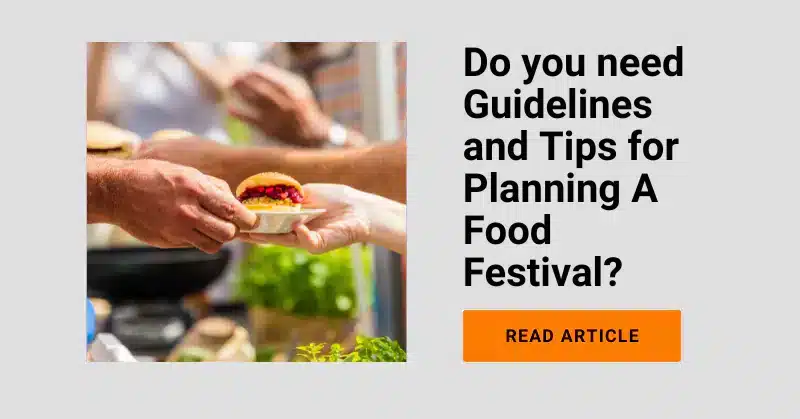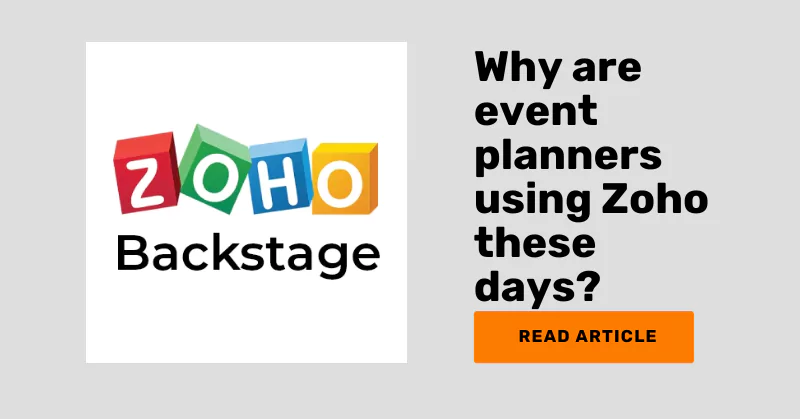You’re reading this because you’re about to organize a food festival but don’t know where to start. You need all the advice in the world in just a few minutes worth of reading.
Don’t worry, we have curated all the knowledge about it for you to learn. No matter whether you’re a beginner or a seasoned professional, you’ll surely find something useful here.
So, as promised, let’s quickly get started with the best-curated food festival guide for you.
A. Food Festival Budget Guide
Getting your finances in order is a crucial step for any event planning process. So let this guide help you get it in order for your food festival.
You’ll first need to know the various expenses you’ll be having. Here’s a list of what you can’t miss in the list.
- Venue rental cost (including parking space)
- Entertainment expenses such as DJs, clowns, dancers, comedians, etc.
- Event permits from the government or local authorities (discussed in detail later in the article)
- Decoration, furniture, and setup cost for the same
- A/V system and other electronics
- On-site volunteers or workers to ensure the event goes smoothly
- Insurance in case anything goes wrong
- Security measures such as cameras and personnel
- Water supply
- Electricity or power supply
- Emergency funds for last-minute expenses
Note that you can add more to this list depending on your event specifications. But try not to subtract anything.
Then, you can contact vendors to know what your expenses will look like. After selecting what fits your budget, allocate the budget amongst the various categories.
Save at least 15% of the budget excluding your profit margin for contingencies.
B. Tips on How To Choose The Perfect Venue
Choosing the venue properly plays a very important role. Planning a food festival requires you to have a venue that ticks most objectives.
The first objective is to have a functional and practical venue. It should be compatible with all the electricity and water needs a food festival requires.
It should also be appropriate for the weather. For example, for monsoons, try to go for indoor venues.
The venue must also be easily accessible to people. Try not to go for far-off locations that are far from the event hotspots. The venue should also be appealing to your target audience. One way to achieve this is by going for venues that have hosted similar events in the past.
Also, ensure that the venue is spacious enough for the attendees to sit and move around. However, it should not be too spacious that people find the food festival empty.
Lastly, find venues that are flexible with dates and adjust to the needs a food festival planner may have.
C. Find your USP
The most important tip this food festival guide will give is to find a differentiating factor. You can even call it a USP or unique selling point.
The way you create USP will be a large indicator of your creativity and marketing skills. But we’re not going to leave you at that. Here are some ideas for creating your USP:
- Integrate art and music into the food festival
- Have pop-up stores so people can buy packed food or other items
- Get some of the cheapest food vendors on board and fight the price war
- Pick a particular cuisine or country
- Make a solely street food or gourmet food event
- Have live food counters or barbecue stations
- Serve alcohol and make it a whole party by sunset
We recommend you use these cues as a starting point for your event marketing strategy.
D. Check the Calendar
For any event, getting your dates right is absolutely crucial. So, here are some things you must keep in mind when selecting the date.
Make sure your event is not competing with similar events in the vicinity. Don’t lose out on potential clients.
You must also strive to have the event on Fridays, weekends, or long weekends. However, keep in mind that the event isn’t on some religious festival.
Another forgotten tip is to check the weather or make arrangements to deal with it. For example, Horn Ok Please Food Festival recently struggled with untimely rain during their event.
For multi-day events, Friday to Sunday prove to show the best results with much higher footfall.
When carefully selecting the date, check with your venue if they’re flexible about it.
E. The Right Way To Get Vendors On Board
A food fest is nothing without the dozens of food stalls. To get those food vendors to pay and set up a stall at your event, you’ll need to make the first move. Put out a public notice inviting some popular food chains.
You should also strive to reach out personally to particular food chains or vendors. You can shortlist them based on the current trends and your event USP.
When you send them your proposal, ensure that it includes the following crucial details:
- How do you aim to benefit them
- Cost of setting up the stall (you can provide them options such as a simple mobile setup or big tents)
- Various advertising opportunities for them
- Expected footfall at your event
- Details about the furniture, water, tent, and electricity supply from your event
- List of required permits to set up the stall
F. Bag That Sponsor
Getting sponsors at your food fest can be a game changer. You could be reaching out to food brands, fast food chains, and beverage brands. But don’t limit yourself to that, look at Horn Ok Please Food Festival’s sponsorship strategy.
- This event was organized by @sodelhi so in a way, their publicity was taken care of! But that’s not it, volunteers from the team also organized the whole event
- @sodelhi also set up their own food stall with common items like a mojito (who says no to that?) to increase their revenue sources
- They had sponsors in every major category, from ticketing to technology, so everything was taken care of smoothly!
- Horn On Please had strategic partnerships with alcohol brands like Bira and Jack Daniel’s. They helped set up more than 4 bars across the event venue
- They even got @drinkrebound on board, which is a drink to avoid hangovers strategically placed at and near the bars at the venue
- And they even had sponsors for greenery and cleaning, which is something event planners of miss.
With such thought our sponsorship deals, you can get a much better return on investment. It benefits both parties too!
Before you reach out to potential sponsors, make sure you do adequate market research. You’ll need to research your own event too to know which type of crowd you’re attracting.
Then, you must make a list of potential sponsors. When you’re drafting your proposal, make sure it’s unique for each sponsor and highlights their needs and your services.
Once the sponsor is on board, be sure to establish a good relationship with them. Get everything in writing to avoid issues later.
G. What’s On The Menu?
Whe selecting the food items for the menu, we suggest you keep a 3:7 ratio.
Still clueless?
Let’s break it down.
70% of the food items available should be popularly liked common items. Let’s say, for the Delhi crowd, burgers, shawarma, chole bhature, and pizzas are a no-brainer.
30% of the items can be unique and out of the box. This ensures that your event caters to a maximum number of people while also standing out.
H. Guide to Have More Than Just a Food Festival
You may be shocked to hear this, but your food festival can’t just be about food.
You must include other entertainment as well. I mean, everyone appreciates a show to eat to. This can be anything from a nukkad natak, a dance show, or a live band.
We highly recommend you go for indie bands. Why? Because it reduces the event planning costs while also giving them a platform.
I. You Can’t Get Enough of This
Can you guess what the subheading is talking about?
Anything?
No?
Trash Cans.
Yes, this is the next most important thing after food in a food event. When food is being consumed and served at an event over the hours, you can expect lots of litter.
This litter takes away from the event experience of individuals. So, you must have lots of trash cans across the venue. Don’t just keep them in distant corners.
You should also go ahead and make the event sustainable by labeling the trash cans. Read this article for sustainability practices for events.
J. Hydrate Hydrate Hydrate!
Another very underrated food festival advice is to have enough hydration centers at your event. Try to have simple water dispenses to avoid the sale of packaged water. But, if that’s not possible, encourage your attendees to bring their own water bottles.
As a last resort, you may keep packaged water bottles. But try only to have the large water bottles for sale.
Oh, also ensure that there’s running water at all times during the event. This could be for the cooking needs and for hygiene & sanitation purposes too.
K. Food Festival Permits Guide
All events are backed by paperwork. To ensure that your event doesn’t fall into any legal problems, you might need some or all of the following permits:
- Noise Permit
- Alcohol License
- Fireworks/fire Permit
- Health Permit
- Business License
- Building Permit
- Event Permit
- Premises License
L. Sanitation Guide for Food Festivals
At a food festival, handling food properly should be your utmost priority. Not only are the attendees concerned about it, but you’re also responsible for everyone’s health.
To ensure that there are no upset stomachs, here are some general practices you may follow:
- Food handlers must be well groomed with cut nails, clean clothes, and hair pulled back
- All food items must be fresh
- Don’t mix raw meat with cooked meat to avoid cross-contamination
- Make sure electricity is available at all times so items can be kept frozen
- Ensure that your food handlers are wearing gloves and masks
- All cooking equipment and containers should be clean
With that, you’re probably overloaded with information on how you can organize the best food festival.
But from here, the real task begins—organizing the food festival. And while we’d love to help you with that as well, our work is only to give you the knowledge you need.
However, we don’t have to part ways just yet. Sign up for the newsletter below so we can stay connected with more event planning knowledge.






